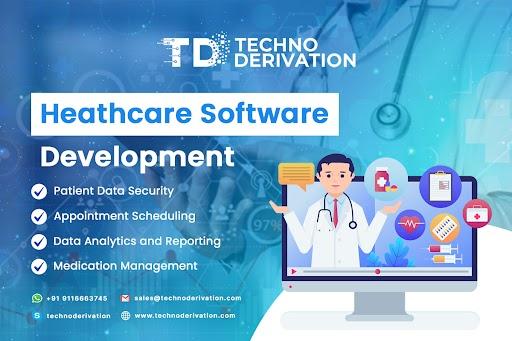Healthcare software development involves the creation and implementation of specialized software solutions designed to enhance and streamline various aspects of the healthcare industry. This field combines information technology with medical expertise to create applications, systems, and platforms that contribute to improved patient care, efficient operations, and better overall healthcare management. Here's a detailed description of Healthcare software development:

1.Electronic Health Records (EHR) Systems:
Healthcare software developers create EHR systems that digitize and centralize patient information, making it accessible to authorized healthcare professionals. These systems facilitate real-time data sharing, reduce paperwork, and enhance the overall accuracy and efficiency of medical record-keeping.
2.Practice Management Software:
Practice management solutions help healthcare providers automate administrative tasks, such as appointment scheduling, billing, and inventory management. This leads to more efficient operations, reduced errors, and improved financial management for healthcare facilities.
3.Telemedicine and Remote Patient Monitoring:
Healthcare software developers are at the forefront of creating platforms that enable telemedicine and remote patient monitoring. These solutions facilitate virtual consultations, remote diagnostics, and continuous monitoring of patients' vital signs, promoting access to healthcare services and reducing the need for in-person visits.
4.Clinical Decision Support Systems (CDSS):
CDSS assists healthcare professionals in making informed decisions by providing evidence-based information and recommendations. These systems integrate medical knowledge, patient data, and research findings to support accurate diagnoses and treatment plans.
5.Health Information Exchange (HIE):
Interoperability is crucial in healthcare, and HIE platforms allow the secure exchange of patient information among different healthcare providers. Healthcare software development focuses on creating systems that ensure data interoperability while maintaining the highest standards of security and privacy.
6.Mobile Health (mHealth) Applications:
With the proliferation of smartphones, healthcare software developers create mobile applications that empower users to manage their health and wellness. These apps can include features for medication reminders, fitness tracking, and access to personalized health information.
7.Data Analytics and Business Intelligence:
Healthcare software development involves creating tools for analyzing large datasets to derive meaningful insights. These analytics solutions help healthcare organizations make informed decisions, identify trends, and optimize resource allocation for better patient outcomes.
8.Cybersecurity Solutions:
Given the sensitivity of healthcare data, software developers in this field focus on robust cybersecurity measures. They implement encryption, access controls, and other security protocols to safeguard patient information from unauthorized access and cyber threats.
9.Regulatory Compliance Software:
Healthcare software must comply with various regulations and standards, such as HIPAA (Health Insurance Portability and Accountability Act). Developers create solutions that ensure healthcare organizations adhere to these regulatory requirements, protecting patient privacy and data security.

In summary, healthcare software development plays a pivotal role in modernizing and improving the efficiency, accuracy, and accessibility of healthcare services. Developers in this field collaborate with healthcare professionals to address specific needs and challenges, ultimately contributing to better patient care and outcomes.





